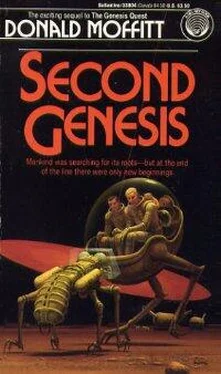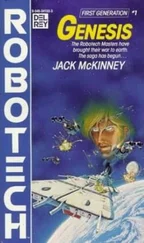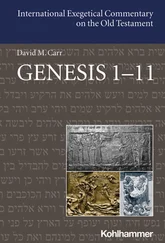Elsewhere, one of the spindly horrors ran at a group of people and emerged with a screaming victim in its mouth. It ran off with its prize, munching as it went, dropping a trail of arms and legs behind it.
Two more of the insect-beings bore down on the group of shaken people gathered around Jorv’s headless body. They were a terrifying sight, but no one ran. An extensible lip shot out and clasped someone’s leg in its prehensile hooks, but two quick-witted people threw themselves on the victim and prevented him from being dragged back. Men and women with poles, shovels, axes—anything that could be used as a weapon—converged on the monster from both sides. It loosed its grip, leaving a mangled leg that would have to be regenerated if the victim lived, and swung its three-lobed head at its tormentors. The lip raked across one victim, tearing flesh, and another man went down under the onslaught of the barbed head-legs. But other people harried it from behind, and when it swiveled its killing apparatus around to deal with them, a brave woman with a pole leaped high into the air and jabbed at a globular eye from above.
Meanwhile Bram saw the other creature rushing straight at him. The facial limbs were already extended for grasping. He knew he would be no match for the lightning thrust of the feeding apparatus—it surpassed his reach, even with the iron bar in his hand.
He dropped the bar and wrenched one of the heavy display tables from the ground. He put his whole back into it, swiveling from the hips. It was a massive piece of rough carpentry, twelve feet long, laden with rock and metal fragments that the archaeologists had not bothered to pack up. In the infinitesimal gravity, he could have lifted a weight ten times as heavy, but speed was the problem, and he needed all his muscular strength to overcome the inertia.
The table became his shield as the creature’s lip struck. There was a sound of splintering wood, and Bram felt himself being driven back by the thrust. A rain of jagged stone and metal pelted his adversary. Bram shoved back, hard, and the weight of the table helped him; his feet were braced against the ground, while his opponent, losing contact, clung to the table as Bram ran it at full speed into the wall.
Three or four people ran to help him keep the creature pinned against the wall while somebody finished it off with an ax.
They stood around panting. “We’re monkeys, monkeys,” Ame sobbed beside him, and he became aware that she was one of the people who had helped him keep the creature pinned. “I thought we were human, but we knew in our bones how to gang up on them.”
“All the rocks and junk confused it for a minute,” Jao said. “Just long enough.”
That gave Bram an idea. “Throw things at them!” he shouted.
The carnage on the floor was terrible. The insects had better reach with their legs and facial snares than the humans did with their shovels and axes, and they were very quick.
Jao was the first to react. He scooped up an armful of archaeological detritus from one of the big tables and sent a hail of missiles at another of the spindly creatures that was heading in their direction. It veered off. A sharp fragment caught it in one eye. Its lip shot out reflexively to find an enemy.
People were quick to get the idea. There were plenty of sharp objects to throw: shards from the long tables, cast-off equipment, and rubble from the floor itself. A barrage of missiles peppered the creatures from ground level and pelted them from the balconies. They came from all directions, thunking into the stiff hides, finding pulpy spots. There was no way for the creatures to avoid them, as marvelous as their eyesight was and as quick as their reflexes were. Every time they made a dash at a group of people, they were met by a volley of hurled objects.
Not that they were always turned aside. Sometimes they barged into a group, knocking people over and lacerating them, and carried someone off. They seemed to have no concept that they were outnumbered.
And then some brainy person reinvented the spear.
It was only a kitchen knife lashed hastily to a pole, but its-owner—maybe losing his nerve about running it into an enemy personally—flung it at an insect-thing as it passed him. The blade hit a soft spot, and the creature ran by with the pole sticking out of it. Another person threw another improvised pike, then everybody who had a sharp stick seemed to join in. The wounded creature began to run in circles, snapping at the skewers in its hide, then grew weaker and less purposeful, sinking to its four skeleton knees. When the surrounding people saw that it was safe to approach it, they hacked it to pieces.
Something new had entered human affairs—a thing that could kill at a distance.
It was over in another fifteen minutes—not without more human casualties. The last insect survivor, seeing that it was alone, fled.
“Don’t let it get to its space suit!” Heln cried.
A bunch of people took off in pursuit, but it evaded them. Later, Bram reconstructed what had happened. The insect-thing had killed two people it found in the tunnel on the inner side of the air lock, retrieved its space suit, and charged into the crowd outside. With its coffer of a helmet on—its facial limbs caged up, and, perhaps, its senses muffled—it was no longer aggressive. Nobody outside knew what had been going on. The crowd parted to make way for it, and the deputies were pleased to see that nobody interfered with it. It hightailed it back to its barrel-wheeled vehicle and drove out of town.
The killing spree had left seven dead aliens and more than thirty dead and dismembered human beings. It was going to be hard to tell the enact number until the body parts that were strewn over the chamber were matched up. Bram moved among the weeping people, viewing the butchery. One of the dead was Alb, the junior archivist whom Bram had reprimanded. Somehow he had slipped past the deputies and gotten inside; poor Alb, he had thought it all a lark.
“I suppose it was the space suits,” Heln said, white as flour. “We didn’t look appetizing to them inside ours, and their own feeding impulses were stifled with a sheet of plastic cutting off their sensory world.” She shuddered. “They like their food live and moving. I wonder what kind of livestock they carry with them in that tube vehicle of theirs.”
Nobody had thought about that part of it. Ame looked ill. Bram remembered the creatures’ behavior just before they had taken time out to return to their vehicle for a rest break.
“Maybe animals about the size and shape of a Cuddly,” Bram said. “Possibly even mammals.”
“Yah, the Cuddly popping up in front of that thing was what tripped the switch,” Jao said.
Heln gave the others a bleak look. “Yes, that and poor Jorv, sticking his face inside their unobstructed striking range. Their brains are rewired now. They’ve been programmed to see human beings. As food.”
They spent the next day burying the dead—what could be found of them. Bram found some words in King James that seemed to express what everybody was feeling and read them aloud over his suit radio while the surviving human population stood around the grave site, heads bowed inside their helmets. The terrestrial biology group under Jorv’s assistant took charge of the insect carcasses and began to do autopsies.
When Bram called Yggdrasil, Jun Davd urged him to close down the digs and return at once. “It’s an unlucky place now, I fear. If Heln is correct, the danger’s just beginning.”
“I’m sending the first shuttle loads out today. We should all be evacuated by the day after tomorrow. In the meantime, I’ve posted a guard. The main thing is not to let them get inside the pressurized buildings with us.”
Читать дальше












